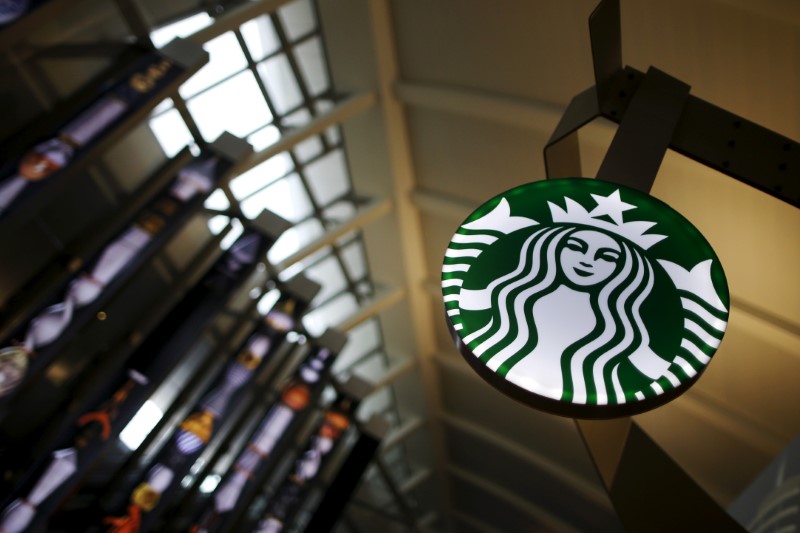By Lisa Baertlein
(Reuters) - Starbucks Corp (O:SBUX) has too many stores and its prices are too high, Wall Street analysts are starting to agree, as they seek to explain the company's slowing U.S. growth.
The world's biggest coffee chain now has more U.S. locations than McDonald's Corp (N:MCD) but it has been struggling for more than a year to lure the traffic needed to deliver the growth that investors have come to expect.
Executives last week warned that Starbucks' 2018 same-store sales growth would be at the low end of its forecast. The chain reported a 2 percent U.S. quarterly same-store sales gain that fell short of expectations on flat holiday traffic. Two years ago, those sales jumped 9 percent.
Starbucks itself has offered a laundry list of reasons for the deceleration in its domestic business, including weak retail traffic, changes to its rewards program, bottlenecks from a crush of mobile orders, and holiday merchandise and drink specials that failed to "resonate" with customers.
Executives concede that Starbucks' U.S. afternoon business has dragged down results in its most important market.
Still, they say that Starbucks - which had 14,163 U.S. locations at year-end, 25 percent more than five years ago and 127 more than McDonald's - is not cannibalizing its own sales or losing share in a market crowded with coffee sellers ranging from independent cafes to fast-food chains and convenience stores.
Analysts disagree. A recent analysis of restaurant industry trends, retail traffic and other factors led Bernstein analyst Sara Senatore to solidify her view that "excess unit growth, at a time when Starbucks is reaching a more mature stage of growth, is the root cause" of the company's domestic woes.
"Rather than a litany of excuses, we believe this is best explained by overcapacity in the industry," said John Zolidis, president of Quo Vadis Capital, a Paris-based boutique research firm. "Starbucks is contributing to the problem by opening new units."
Credit Suisse (SIX:CSGN) analyst Jason West said the brew of stepped-up competition combined with Starbucks' recent opening of roughly 700 U.S. stores a year, is weighing on its "ability to re-accelerate growth."
Starbucks said on Friday its new cafes perform well and bring more business to all nearby coffee shops, not just its own.
Proliferation of stores is not Starbucks' only problem, according to analysts. Zolidis also sees another troubling sign: "We believe the company has raised prices too much."
Starbucks did not immediately comment on pricing.
McDonald's and Dunkin' Donuts, owned by Dunkin' Brands Group Inc (O:DNKN), have been holding down drink prices, said Maxim Group analyst Stephen Anderson, who analyzes 10 markets in the U.S. Northeast, including New York, Boston and Washington.
McDonald's - now selling $1 coffee and $2 small espresso drinks - has kept prices mostly flat for the last two years. Dunkin Donuts' has raised prices by roughly 1 percent per year, while Starbucks has raised prices by about 3.5 percent each year, said Anderson, who added that the rivals may be peeling off some of Starbucks' less-affluent customers.
